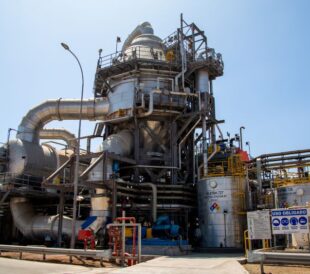Having the support of a data management solution with intrinsic flexibility enables laboratories across all industries to increase productivity and efficiency. As the largest refiner in the U.S., Marathon Petroleum Corporation (MPC) needed a LIMS capable of centralizing the laboratory operations of multiple locations over three North American time zones. At the same time, they needed a system that could help drive automation of laboratory tasks and connect with a variety of instruments and systems without sacrificing upgradability. 
During a recent webinar with Petro Industry News, MPC chemist and LIMS Administrator Seth Heupel spoke about his experience with Thermo Scientific™ SampleManager LIMS™ software. Heupel has been employed with MPC for over 10 years, initially as a laboratory technician. Over the last six years, Heupel has served as laboratory bench chemist and LIMS administrator for the process control laboratories at two of Marathon Petroleum Corporation’s refineries. His current focus is servicing Marathon’s Galveston Bay Refinery, the largest facility of their 16-refinery system.
Heupel explained the value of centralizing laboratory operations with an enterprise LIMS deployment. MPC began its enterprise LIMS deployment in 2015, when they deployed the system across nine of their operating units. The LIMS deployment now provides a single data repository for 17 operating units. Configuration changes provide each site with their own view of the LIMS data for the best user experience, while maintaining upgradability.
One key to the efficiency and productivity gains realized by MPC, Heupel said, is SampleManager LIMS software forms functionality. Forms enable laboratories to automate processes for improved efficiency and decreased risk of data entry errors. Heupel outlined two examples of how forms enabled MPC laboratories to achieve new levels of efficiency: integrating SampleManager LIMS software with MPC’s chromatography data systems (CDS) and automating density analysis.
Linking LIMS and CDS
One of the first forms MPC developed with SampleManager LIMS software facilitated chromatography sequence processing with the company’s CDS. MPC refineries use a mix of chromatography solutions, including Thermo Scientific™ Chromeleon™ Chromatography Data System and third-party solutions. It needed a flexible solution capable of interfacing with data systems and instruments from several different vendors without disrupting the lab technicians and their workflows.
Using the forms functionality in SampleManager LIMS software, MPC built a form that integrates a user’s backlog in LIMS with their third-party CDS software. This form enables the user to download a sequence to the CDS, or download and start the sequence. The user can drive operation of the chromatography instrumentation directly from SampleManager LIMS software. Users can select which instrument and method they want to use for the sequence. Since the instruments and methods are associated with an analysis, the form helps prevent user errors that can result in bad data. Further, user permissions can be assigned by location, which helps prevent sites from accidentally queuing a run using another site’s instrumentation.
The form also supports entry of internal standards, multipliers, and sample amounts within the sequence. Users can also duplicate analyses for additional efficiency.
Automating density measurements
Another form MPC developed links the LIMS to MPC’s densitometers for automated density tests. With a simple right-click on a LIMS worklist, the form queues a density run using MPC’s Anton-Paar densitometer from the user’s test backlog. The form interfaces with Anton-Paar LIMS Bridge software, enabling the analyst to set up a run of samples and leave the instrument unattended while the sequence is running. The ability to run those sequences unattended resulted in an 80 percent reduction in analyst hands-on time for density analysis, according to Heupel.
Result data is automatically returned to the LIMS. The form includes error-checking functionality to prevent erroneous results from being reported to the LIMS. By eliminating erroneous results and manual data entry, MPC has experienced improved productivity and better data.
MPC’s densitometer form also supports duplication of rows within the analysis to send separate results to the same analysis in SampleManager LIMS software. This functionality is useful, Heupel said, when testing whether a tank of product is homogeneous. The laboratory will create an upper, lower, and middle tank sample and have those included in a single analysis. SampleManager LIMS software recognizes when there are different results associated with an analysis, and automatically directs the results to the correct components of the analysis.
Watch the webinar to learn more
Read part 2 of this blog, or visit our website for more information on how SampleManager LIMS software solutions enable laboratories across all industries to increase productivity and efficiency.




Leave a Reply